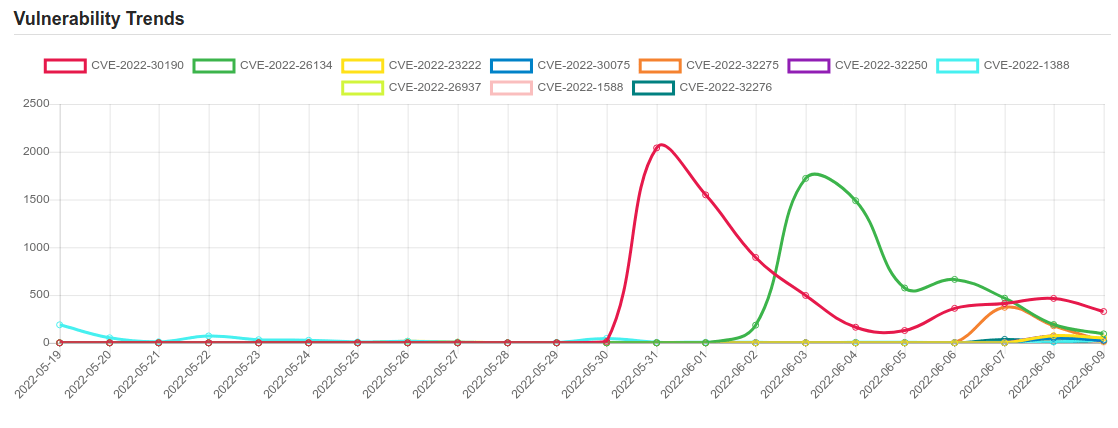Daily Vulnerability Trends: Fri Jun 10 2022

| CVE NAME | CVE Description |
| CVE-2022-1588 | ** REJECT ** DO NOT USE THIS CANDIDATE NUMBER. Reason: This CVE has been rejected as it was incorrectly assigned. All references and descriptions in this candidate have been removed to prevent accidental usage. |
| CVE-2022-32276 | No description provided |
| CVE-2022-30287 | No description provided |
| CVE-2022-31625 | No description provided |
| CVE-2022-31626 | No description provided |
| CVE-2022-1609 | No description provided |
| CVE-2018-13379 | An Improper Limitation of a Pathname to a Restricted Directory (“Path Traversal”) in Fortinet FortiOS 6.0.0 to 6.0.4, 5.6.3 to 5.6.7 and 5.4.6 to 5.4.12 and FortiProxy 2.0.0, 1.2.0 to 1.2.8, 1.1.0 to 1.1.6, 1.0.0 to 1.0.7 under SSL VPN web portal allows an unauthenticated attacker to download system files via special crafted HTTP resource requests. |
| CVE-2022-24713 | regex is an implementation of regular expressions for the Rust language. The regex crate features built-in mitigations to prevent denial of service attacks caused by untrusted regexes, or untrusted input matched by trusted regexes. Those (tunable) mitigations already provide sane defaults to prevent attacks. This guarantee is documented and it’s considered part of the crate’s API. Unfortunately a bug was discovered in the mitigations designed to prevent untrusted regexes to take an arbitrary amount of time during parsing, and it’s possible to craft regexes that bypass such mitigations. This makes it possible to perform denial of service attacks by sending specially crafted regexes to services accepting user-controlled, untrusted regexes. All versions of the regex crate before or equal to 1.5.4 are affected by this issue. The fix is include starting from regex 1.5.5. All users accepting user-controlled regexes are recommended to upgrade immediately to the latest version of the regex crate. Unfortunately there is no fixed set of problematic regexes, as there are practically infinite regexes that could be crafted to exploit this vulnerability. Because of this, it us not recommend to deny known problematic regexes. |
| CVE-2022-26377 | Inconsistent Interpretation of HTTP Requests (‘HTTP Request Smuggling’) vulnerability in mod_proxy_ajp of Apache HTTP Server allows an attacker to smuggle requests to the AJP server it forwards requests to. This issue affects Apache HTTP Server Apache HTTP Server 2.4 version 2.4.53 and prior versions. |
| CVE-2022-29464 | Certain WSO2 products allow unrestricted file upload with resultant remote code execution. The attacker must use a /fileupload endpoint with a Content-Disposition directory traversal sequence to reach a directory under the web root, such as a ../../../../repository/deployment/server/webapps directory. This affects WSO2 API Manager 2.2.0 and above through 4.0.0; WSO2 Identity Server 5.2.0 and above through 5.11.0; WSO2 Identity Server Analytics 5.4.0, 5.4.1, 5.5.0, and 5.6.0; WSO2 Identity Server as Key Manager 5.3.0 and above through 5.10.0; and WSO2 Enterprise Integrator 6.2.0 and above through 6.6.0. |
| CVE-2022-30790 | Das U-Boot 2022.01 has a Buffer Overflow, a different issue than CVE-2022-30552. |
| CVE-2022-31813 | Apache HTTP Server 2.4.53 and earlier may not send the X-Forwarded-* headers to the origin server based on client side Connection header hop-by-hop mechanism. This may be used to bypass IP based authentication on the origin server/application. |
| CVE-2022-30190 | Microsoft Windows Support Diagnostic Tool (MSDT) Remote Code Execution Vulnerability. |
| CVE-2022-26134 | In affected versions of Confluence Server and Data Center, an OGNL injection vulnerability exists that would allow an unauthenticated attacker to execute arbitrary code on a Confluence Server or Data Center instance. The affected versions are from 1.3.0 before 7.4.17, from 7.13.0 before 7.13.7, from 7.14.0 before 7.14.3, from 7.15.0 before 7.15.2, from 7.16.0 before 7.16.4, from 7.17.0 before 7.17.4, and from 7.18.0 before 7.18.1. |
| CVE-2022-23222 | kernel/bpf/verifier.c in the Linux kernel through 5.15.14 allows local users to gain privileges because of the availability of pointer arithmetic via certain *_OR_NULL pointer types. |
| CVE-2022-30075 | In TP-Link Router AX50 firmware 210730 and older, import of a malicious backup file via web interface can lead to remote code execution due to improper validation. |
| CVE-2022-32275 | Grafana 8.4.3 allows reading files via (for example) a /dashboard/snapshot/%7B%7Bconstructor.constructor’/.. /.. /.. /.. /.. /.. /.. /.. /etc/passwd URI. |
| CVE-2022-32250 | net/netfilter/nf_tables_api.c in the Linux kernel through 5.18.1 allows a local user (able to create user/net namespaces) to escalate privileges to root because an incorrect NFT_STATEFUL_EXPR check leads to a use-after-free. |
| CVE-2022-1388 | On F5 BIG-IP 16.1.x versions prior to 16.1.2.2, 15.1.x versions prior to 15.1.5.1, 14.1.x versions prior to 14.1.4.6, 13.1.x versions prior to 13.1.5, and all 12.1.x and 11.6.x versions, undisclosed requests may bypass iControl REST authentication. Note: Software versions which have reached End of Technical Support (EoTS) are not evaluated |
| CVE-2022-26937 | Windows Network File System Remote Code Execution Vulnerability. |
If you like the site, please consider joining the telegram channel and supporting us on Patreon using the button below.


